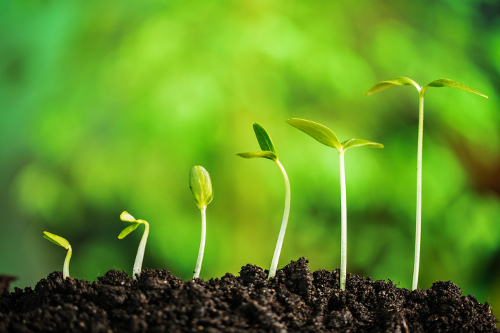You’ve set up your first garden, or you are preparing to do so, and you’re wondering if there’s anything you’re missing. The land is cleared and you have bags of soil ready to go. Suddenly, you remember hearing something about compost.
Do you really need to spend money on compost? What are the benefits of compost? If so, should you buy premixed compost or should you build your own system? Should you invest in a worm composting system?
Practical Benefits of Using Compost
Compost describes the natural process of the decomposition of organic matter. During this process, countless varieties of micronutrients are released from the plant matter. These nutrients, when properly composted, can be added to soil and provide plants with what they need to reach their full potential.
What are some of the key benefits of using compost?
- Improved soil structure. Not only does it add micronutrients to the soil, but compost improves the overall structure and texture of the soil. Structure is a term used to describe how the inorganic particles combine with decayed organic particles. Inorganic particles are sand, silt and clay. Each type of inorganic particle benefits from compost in different ways. The overall result is that the soil itself will retain more nutrients, air and moisture. This creates healthier and stronger plants.
- Time released nitrogen. Compost is created out of many different types of organic matter. Each type decomposing at different speeds. Part of the decomposition process is releasing nitrogen. Nitrogen is vital to the overall balance of the soil and health of the plants within. Generally speaking, organic matter will release 25% of its nitrogen in the first year, 10% the second and third years and 5% during the fourth and fifth years. This time released nitrogen will continue to generate health plans for years to come.
- Fewer pest problems and diseases. Some research has indicated that using compost can prevent unwanted pests. Compost helps to control diseases by providing organic matter that can prevent the spread of disease by having natural checks against them. It is specifically beneficial against fungal infections that can destroy roots if unchecked. Furthermore, the variety of micronutrients provided by the compost enhanced soil will create a healthier plant and root structure.
As you can see, compost helps gardeners and landscapers in many ways. It works as mulch, a soil amendment or as an ingredient in potting mixes.
Worm Compost Systems vs. Premixed Compost
It’s now clear that you do really need to use compost for your garden, lawn care or potted plants. You’ve likely discovered that there are dozens of ways to involve compost with your gardening or landscaping project.
Two of the primary options are premixed compost and do-it-yourself systems. Should you invest in your own system? Or should you just buy premixed compost?
The answer will vary based on how much time, money and effort you’re willing to invest in your garden. Buying premixed compost bypasses tons of time and energy that is required for operating your own compost system. However, it may not be the best.
One of the downsides of premixed compost is that they are precisely mixed and may not be right for your situation. Precise mixing may seem like a benefit, however, the variety and randomness of organic matter in your own mixes is typically more beneficial to your plants. Standardized compost, such as the premixed varieties, are only beneficial if you know exactly what your plants, lawn or potted plants require. Even if you do, you’re likely going to provide your plants with a greater variety of nutrients by using your own compost system.
If you have some time to spare, investing in your own composting system will be cheaper and will likely be more beneficial to your plants. There are dozens of ways to create your own composting system. Some prefer to throw all of their organic matter into a bin, stir it regularly and then use that compost.
However, there is a better, more efficient way to generate nutrient rich compost. It’s called vermicomposting. Or, to say it another way, worm composting. Using a worm composting system will quickly (relatively) turn organic waste and garbage into ‘black gold’.
Here’s an overview of the entire worm composting process:
- Buy or build a worm bin. You can either build your own worm bin or you can buy a premade vermicomposting system. Premade systems greatly eliminate much of the chores that come with worm composting. A premade system is typically made out of several layers of bins with a release valve at the bottom. Conversely, if you create your own worm bin you will have to deal with a messy harvesting process.
- Add your waste. Once you’ve setup your own or purchased a worm bin, you’ll be ready to start adding organic waste. Raw fruits and vegetables are ideal. However, paper can also be used. Avoid meats and dairy products as well as any highly acidic fruits, such as oranges.
- Add your worms. Red worms, or red wigglers, should be used for your worm composting bin. Countless gardeners have found that this species of worm eat the most and product composting bin the fasts.
- Let them feast. Receiving your finished product will depend on how you’ve setup your worm system. Typically, it will take a few months before your ‘black gold’ is ready for harvesting. If you’ve used a premade system you may see results slightly faster.
- Harvest and use. The harvesting process will be very easy for those who invested in a premade system – simply turn the nozzle at the bottom. Harvesting will be much more complicated for those who built their own. There are several methods, many of which involve dumping everything out and separating the worms. This is why premade systems are well worth the investment.
Yes, You Really Do Need Compost
Compost provides several important benefits and is easy to create. You may buy premade compost mixes or invest time into creating your own system. For best results, purchase a premade worm composting system and harvest nutrient rich compost that can be used to take your garden to the next level.
Article by Donny B


Be the first to comment